
Randy’s 2023 Financial Plan of a Lifetime!

Stay in the friggin’ boat!
I’m in the boat!! I have never left the boat. I don’t plan on ever leaving the boat. If I get out of the boat, I might get wet. Heck, I might drown.
Just to be clear I don’t own a boat. This is not a story about boats.
This is my annual update to my “Financial Plan of a Lifetime” which I developed more than 20 years ago. I update my results with the plan and share them with my newsletter subscribers and others via social media. Some people think I do this to teach others how to manage money. That is not the case. I do this to remind myself what I need to be doing to be successful!

Just for fun let’s carry on with our boat theme for a moment. Let’s say we have three boats. Every boat needs a name, doesn’t it? I would like for you to metaphorically hop into one of these three boats. The names of these boats are simple to remember. They are named “25”, “50” and “75”. Which boat should you get into? I’d like you to jump in the boat whose name corresponds as close as possible to your age.

For you folks getting into boat “75” watch yourself. You’re not as spry as you once were. No need to pay too close attention to what I’m sharing today. Not to be morbid but your boat isn’t sailing as far as the 25 and 50 boats. Don’t be offended. I’m sitting in the seat right behind you. Just get in the boat and enjoy the ride, the fresh air, and the sunshine. You DO have the option of enjoying every day in the 75 boat no matter how much further it sails.

Sailors near the age of fifty need to get into the “50” boat. Most of you folks are killing it. You’re making more money than you ever thought you would. Maybe you have saved some of that money and maybe not. Look around your boat. Some people are getting ready to enjoy the benefits of early retirement. Some are saying to themselves. Retirement? I don’t think I will ever be able to afford retirement! I think the men and women in this boat might get the most out of what I’m writing about today.

Yes, you people who qualify for boat “25” have the biggest opportunity to learn from what I share today. My advice to you? Don’t screw this up! You’re healthy! You don’t have much money. Living with mom and dad helps. You’re just now getting into the workforce. Time is much more limited than when you were going to school and free. Nevertheless, you have time on your side. If you know how to use that time for your financial future you might be retiring even earlier than I did. I hope so!

That being said, a rising tide floats all boats and in the long run, the tide (stock and bond markets) always rises. Regardless, of which of the three boats where you are a passenger…make the boat do the work for you!
You probably know or are reminded that I update you every year on my retirement investment progress no matter how well I do.
Each year I share with those who are interested a financial update. I will tell you how I’ve been doing financially after deciding I wanted to do something else with my life other than work for the man as I had done since my early 20s. I won’t bullshit you. I will share the actual numbers and how I made things happen for my family and me. Do you really think it’s a good idea to take advice from me? Maybe. Only you can answer that.

What’s my retirement grade?
So how have I done by staying in the boat? If you don’t mind my saying it, I’m going to give myself a grade of A-. How do I come to that conclusion?
I retired at the age of 52. I’m in my 22nd year of retirement. I have been invested in the markets after retirement, through October 11, 2023, for 21 years. I have never earned a single dime of work income during retirement. I have routinely traveled to more than 10 different countries every year during retirement. In total, I have traveled to nearly 100 countries. Yep. I travel more than 175 nights every year all over the country and the world. Think about that. 175 nights. For virtually every one of those days, that’s a hotel, a rental car, three meals a day…at restaurants, and a boatload of airline tickets. See what I did there?
I was fully invested through the second-biggest financial crisis in our history after the great depression and during a global pandemic. If that was all I had done I would have given myself an A. However, I must tell you I have more money today than when I retired 22 years ago. Sounds good, right? No, that is bad. I can only give myself an A- based on this fact. I’ll tell you why as we move along.
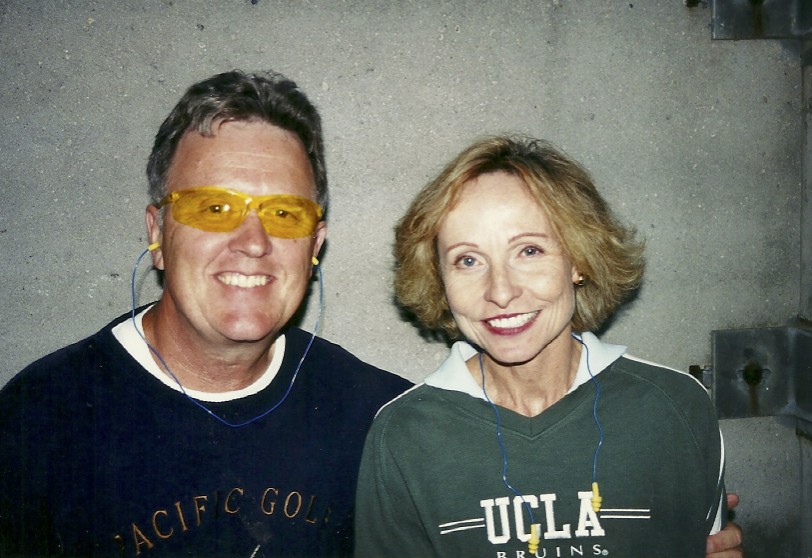
I means we…the disclaimer.
Much of what I am explaining today seems to make it sound like “I” did it. Nope. I means we. “We” is wife Carol and me. She signs on the dotted line for this stuff just as I do. I always like to remind her that if I go to jail for overstating the value of my assets, she will be right behind me. This always freaks her out!

I also have several strong financial confidants not the least of which is our son, J.J. I get the chance to bat around financial ideas almost daily with different sources. Podcasts are an outstanding resource as well. I take what they all say and throw it into the pot. Then I sample the stew and I act. I always act. Some folks look at this stuff and don’t act. I always act.
What is the advantage of retiring early?
Most people who retire early will have more healthy years of retired life. Most people will get to call their own shots in retirement. Most people will tell you they wish they had retired even earlier…even if they retired early. Most people will tell you they don’t know how they had the time to work in the first place!

Oops. I can’t leave out this downside.
Oh yeah, there is one significant downside to sharing my 2023 Financial Plan of a Lifetime. I am now 22 years older than when I quit my job for good. Would I be willing to go back 22 years and lose all my investment gains? Yes!
My results.
My fiscal year ends on October 11 each year. Why? Not important. It just does.

My annualized return on investment (ROI) over 21 years is 7.9%. Let’s say I had one million dollars when I retired. That one million bucks invested at 7.9% for 21 years would be worth $4,936,854. Folks, those numbers right there earn me a grade of A. You can add a zero or subtract a zero to make this analysis more relevant to you.

For my FY 2022-2023 (this year) my investments earned 14.9%. That’s not bad! This year’s results were aided because the market tanked exactly on October 11, 2022, LAST YEAR. That hurt last year’s results but helped FY 22/23. Then THIS year the market tanked during the last few weeks of my fiscal year. All year I was tracking with an annualized ROI of 20%+ and the last few weeks took that number down to 14.9%. It is what it was!
Just a note for anyone who wants to compare their results to mine. First, very few people KNOW what their annual ROI is let alone what that number is over a long period of investing. Secondly, unless someone’s portfolio is identical to mine their ROI number does not account for risk. Their portfolio could very well return 7.9% annualized but if that was done with a riskier portfolio then that 7.9% isn’t as good. If a portfolio achieved 7.9% with a portfolio that involved less risk than mine this investor has achieved a superior result to mine.
I am not sharing any of this to pat myself on the back. I am only sharing facts and figures. You the reader can decide if what I am sharing is worthy of a grade of A. You get to decide if my approach to finance might work for you regardless of your age, current financial situation, or what boat you’re in. Remember if you’re in boat 75 or boat 50 and you have someone in your life who might qualify for boat 25 you can always forward this message to them. Lots of people tell me they do that.
If you think retiring early to pursue a life of leisure and never having to work again is a good outcome by having a solid financial plan you might want to continue reading.
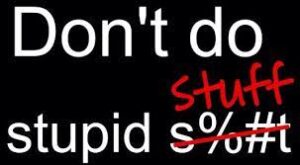
Don’t do this stuff. Just don’t.
Later I will tell you how I did what I did. But first, I want to explain what I avoid doing at all costs. Oh yeah. Graphic too strong? Don’t worry. We’re keeping this light-hearted.

Think you can predict the future? Spoiler alert. You can’t.
Staying in the boat is a metaphor for NOT doing ANY kind of market timing. I have no idea what the market will do tomorrow, next month, or next year. Nobody reading this does. If I tried to time the market I would have to be right TWICE. Once when I decided to get out of the market and once again when I decided to get back into the market. I’ve heard it said that “picking tops and bottoms is for the lucky and the liars.” I don’t have the ego to try to fool myself into thinking I can correctly time the market based on my own expertise or anyone else’s.

When you go to Walmart and you see they’ve lowered prices on your favorite product do you buy more or less? You buy more! When Walmart raises prices, you often buy less of that product. Why is it that when stock prices go lower people want to sell not buy? The typical stock market investor, like you and me, wants to sell when prices fall and buy when prices begin to rise. That’s not good.
It has been said that a very large percentage of investors got out of the market as things were unraveling between mid-2007 and early 2009 during the financial crisis. Many NEVER got back in. The S&P 500 closed at about 815 in March 2009. Today the S&P 500 is more than FIVE TIMES what it was in early 2009. Five times higher than 14 years ago! I certainly would not have known when to get out of the market during this time frame…or when to get back in.
There is no one-size-fits-all when it comes to investing the right way. Unsuccessful investors typically exhibit the same poor investment behavior — market timing, overtrading, trying to outsmart the market, being overconfident in their investment abilities, investing based on political beliefs, etc.

You wouldn’t know what to do with yourself if you didn’t work? Please!
I worked for one company for 30 years. Let’s say in the very first year after finishing my first 30 years of work I had these choices under these circumstances. I had enough money that I didn’t need to ever work again. I knew this because I understand investment returns and spending patterns. What should I do?
Continue working…or get involved with one of the nearly limitless choices I could do with my time? I could go to work for McDonalds. I could volunteer at the Salvation Army. I could sleep in and watch soap operas and game shows all day. I could do just about anything with my time. IF working at the same company I worked at for 30 years was my #1 choice for the future…I should probably have my head examined. Nope. I’m going to pick something else to do with my time just for the variety of the experience. You can work. You can play. You can rest and relax. You don’t have to be on autopilot for the rest of your useful life just because you wouldn’t know what to do with yourself if you weren’t working.

Don’t pay a financial advisor a fixed percentage of your assets to manage your money.
This is going to be a tough one for some readers. Give it your best shot because you consider yourself an objective person, right?
That’s right. This “rule” may be difficult for some people to accept most notably the people who pay someone a fixed percentage of their assets for help. According to Morningstar, “Over the horizon of the last 20 years, less than 10% of U.S. actively managed funds have beaten the market.” If you are not paying a financial advisor to actively manage your investments and BEAT the market then what are you paying them for? YOU can match the market. I have matched the market. To do that you only have to own the market. Most people don’t understand this. You can’t beat the market. You can’t beat Vegas. You truly understand that, right?
Let’s say a financial advisor charges you 1% to manage the assets in your portfolio. Can your financial planner beat the market? As noted above less than 10% of U.S. actively managed funds have beaten the market. You’re going to be able to pick the financial advisor who CAN beat the market? Really? You’ve got less than one chance in ten of success with that idea. Good luck. I have earned 7.9% by owning the market (66% stocks; 34% bonds). A financial advisor, who charges 1% to manage your assets would have to earn 8.9% to match my market return of 7.9%. Earning 8.9% is 12.6% better than 7.9%. A financial advisor would have to be 12.6% better than the market simply to match the market as I have done. Folks, do you believe in Santa Claus?

Just how expensive is it to pay a financial advisor to manage your assets at a cost of 1% of assets under management? I told you that one million dollars invested at the rate of return I’ve earned over 21 years, 7.9%, would be worth $4,936,854. What is one million dollars worth invested at the rate of return of 6.9% (return decreased by 1% to account for a financial advisor’s fee) over 21 years? How does $4,060,054 sound? That doesn’t sound very good to me. That’s a difference of $876,801! Are you willing to pay nearly one million dollars to have a financial advisor try to match the market when you can do that yourself? Buying the market is not all that difficult to do. I’ll tell you more about that below.
But Randy some might say, “I don’t have the knowledge of investing that you do. Plus, I’ve known Charlie/Jane for years and we’re good friends. The guy’s my brother-in-law for gosh sakes. Firing him won’t go over very well at Thanksgiving dinner. Plus, I don’t have to think about this investing stuff. I can spend my time on the golf course or with the bridge club.”

I feel your pain. It’s just that in the example I described above a financial advisor is DRAMATICALLY more expensive than most people ever imagine. A one percent fee sounds small. The iceberg looked small from ten miles away from the Titanic, didn’t it? Sorry. Too soon?
Hire a professional when you need a professional.
Of course, there will be times when you need the help of a professional. Most folks don’t do their own brain surgery. However, one doesn’t pay a brain surgeon a fixed fee from their financial assets when they only need brain surgery every other summer, right? When you need help with a specific subject like taxes, estate planning, life insurance, or whatever hire a professional…for help with that topic only. Hire them. Let them do the work you need. Pay them. Thank them…and keep their business card.
Take advice only from people doing better than you are in their specialty.
Speaking about taking advice. Here’s my thinking on taking advice. I take advice…with just one proviso. I want to take advice from people who are doing better than me in whatever subject I want to be better in. Who could argue with that?

At age 45 I took up golf. Yes, I had played golf a few times every year before that. This is what I would later come to call, “hit and giggle” golf. If I beat my buddy by a stroke and we both shot about 115 I was more than happy at the 19th hole. When I decided I wanted to retire early I knew that shooting 115 was going to make for some pretty long rounds.
I began to take golf lessons. Why take golf lessons? I figured my golf teacher had taught him or herself to play golf much better than I could. Wouldn’t it be a good idea to take advice from someone doing better than me in something that I wanted to get better at?

I will tell you that I’ve taken 300 golf lessons if I have taken one. After a few years, I got a lot better at golf. Just recently I was going through some old files and found my golf scores from 2004. For ten consecutive rounds, on a course with a slope rating from 132-135, I shot 75, 78, 79, 68, 79, 85, 78, 82 ,79 and 72.

On that particular day, Hobie Brenner was in my foursome. Hobie played in the NFL for the New Orleans Saints for more than 10 years. He scored 21 touchdowns and had 267 receptions. That’s pretty good. However, Hobie and I only played one round of golf together in our lives. To this day, after I shot 68, I’m going to guess Hobie Brenner thinks I’m a pretty good golfer!
What did I learn from this? Who shoots 85 two rounds after they shoot 68? Just ten years later I retired from golf. Why? I knew that I would never be able to shoot these scores as I aged. I figured traveling the world would be a better lifelong endeavor than shooting 85! Someday I will retire from travel just like I did with golf. Learning to play golf well is one of many life examples where taking advice from someone who does stuff better than I do was the right thing to do. This is one of the coolest things about retirement. If you have prepared properly, you can do just about anything you want.

I don’t do business with friends.
O.K. I admit it. This sounds pretty hardcore. I don’t want to pay my friends to get advice. What happens when my friend is no longer giving me advice that I think is worthwhile or worth the cost of that advice? Do I fire my friend? Really? I’m going to get rid of the man or woman who has been my “friend” for years? Not likely. That’s hard to do.
Don’t get me wrong. I want to have a friendly working relationship with every professional I employ. It’s just that these people are my employees for a specific task. They are not my best friends. I employ professionals to help me when I need their help.

Did you know you can pay to get a guaranteed return? What a great way to lose money.
Do you think you can earn a bigger return by taking more risk? Of course, you can. It’s just a question of how much risk you want to take to get whatever return you are looking for.
Conversely, you can pay an amount upfront to get a certain return. Doing that is called buying an annuity. I don’t buy annuities. I would rather take some market risk over getting a guaranteed lower return. You saw how expensive giving up just 1% of your return can be, right? If you buy an annuity you are giving up too much upside in my opinion. Over longer periods of investing in the stock and bond market volatility is reduced to nearly zero. You can see that by looking at my real-life returns over a period of 21 years shown below.
So, what do I do?
I’ve told you many of the things that I think are bad ideas if you want to have success financially. So, what do I think are the right things to do to ensure a successful financial future?
Before you even think about doing the things I do, please make sure what I have done is something you might like to replicate. I retired early. I never worked for money again. I traveled the world. I have more money today than when I retired more than 20 years ago. Does that sound like something that might work for you? Everything in this paragraph is Eagle Scout material except having more money today than when I retired. That’s stupid. That’s dumb. That’s inefficient. Read on, please.

What am I trying to accomplish with my financial plan of a lifetime?
I am not trying to hit home runs. I am trying to hit singles. My expectation is to match the market. With a portfolio of almost exclusively index mutual funds where 2/3 of my investments are in stocks and 1/3 in bonds, I would expect to earn somewhere around 7-8% each year on average. I’ve been invested for 21 years. I think we can call that the long run. I have earned long-run investment returns. No major surprises despite weathering one of the biggest financial crises ever and a global pandemic.
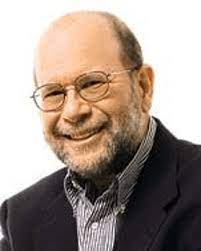
I follow William J. Bernstein.
I know. That headline sort of sounds like I’m part of a cult, doesn’t it? It might be better to say I follow the financial principles of Mr. Bernstein because they are tried and true financial strategies. There are no swing for the fence ideas here. It’s pretty much just do the right thing every day and it’s very likely that after 21 years of investing, you will have matched the market returns and drunk your share of pina coladas at the beach. Think of the meetings I didn’t have to go to if I had continued to work. Does that sound like a lifestyle you might like to emulate?
What does this Bernstein fellow advocate and how did I find him?
As I was getting ready to retire, I read his best-selling books. The first was “The Intelligent Asset Allocator: How to Build Your Portfolio to Maximize Returns and Minimize Risk“. My second Bernstein read was “The Four Pillars of Investing – Lessons for Building a Winning Portfolio”. Everything he was saying hit home with me. What are the four pillars?
- Bernstein stressed the importance of saving and frugality (prioritize long-term financial security over immediate consumption. By consistently saving and investing, individuals can harness the power of compounding and grow their wealth over time)
- Asset allocation (optimal asset allocation based on an individual’s risk tolerance, time horizon, and investment goals)
- Bernstein contends the market is efficient and supports a passive investment strategy (buy and hold)
- The importance of investor behavior and the role of emotions in investment decision-making (stay in the friggin’ boat!)
When I retired (2002) I got some free advice from Vanguard, Deloitte & Touche and used what I had learned from Bernstein’s books. This translated into my investing in 11 different Vanguard mutual funds. Today, more than 21 years later, I still have those same 11 Vanguard mutual funds. I have never deviated. Six of those funds are stock index funds or funds that are nearly index funds. I have five index-like bond funds. These eleven funds cover each genre of stock diversification and bond duration. They all carry super-low expense ratios.
What about ETFs?
By the way, I have dabbled with ETFs with some of my personal funds. I’m not a fan. I don’t see a big advantage over mutual funds. ETFs might cost a fraction less than mutual funds but those savings might be lost between the bid and sell prices. ETFs can only be traded during market hours. I am frequently working on this stuff when the markets are closed. Some people think being able to buy or sell an ETF during market hours is an advantage. People who think like that sound as if they think they can predict what is going to happen in the market in the next minute or hour. My conclusion is that mutual funds and ETFs are so close together that it becomes a matter of personal preference as to which you might like to use.
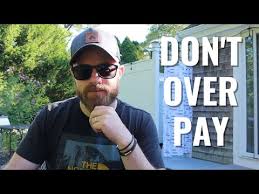
You gotta control investment expenses.
I mentioned the need to control investment expenses. A financial advisor who charges 1% to manage your assets would take $100 for each $10,000 under management. My largest, by asset amount, index mutual fund is the Vanguard Total Stock Market Index fund. This fund has an expense ratio of just 0.04%. Vanguard’s management fee is 1/25 what a financial advisor’s fee is who charges 1%. The cost for Vanguard to manage the Total Stock Market fund is $4 per $10,000 invested!
Bernstein says the market is “efficient”. What does that mean? For the top 8,000 companies, everybody knows everything (it’s public information!) about each company. That means that very few people in the long run, less than 10%, can beat the market. If you believe that, and I believe that, then why would you pay ANYONE $100 to manage $10,000 when they can’t beat a stock index fund?
When I retired, I picked a 66% stock allocation and a 34% bond allocation. Why that ratio? I figured it wasn’t too conservative and those numbers weren’t too aggressive. In hindsight, at age 52 this was probably a conservative play. Had I gone with a 100% stock portfolio I would have much more money today. However, during the financial crisis and the global pandemic when stocks took a nosedive, I might not have survived ulcers! The 66/34 allocation was conservative at the start of retirement and might be aggressive for me today. As it stands now, I don’t plan to change the allocation. Here’s the list of Vanguard mutual funds I have and their operating expense per $10,000.
| FUND | SYMBOL | COST/$10,000 |
| Total Stock Market Index Fund Admiral | VTSAX | $4 |
| Total International Stock Index Fund | VTIAX | 11 |
| U.S. Growth Fund Admiral Shares | VWUAX | 25 |
| Windsor II Fund Admiral | VWNAX | 26 |
| Strategic Equity | VSEQX | 17 |
| Explorer Fund Admiral | VEXRX | 45 |
| Short-Term Investment-Grade Fund Admiral | VFSUX | 7 |
| Short-Term Bond Index Fund Admiral | VBIRX | 7 |
| Intermediate-Term Investment-Grade Fund Admiral | VFIDX | 10 |
| Long-Term Bond Index | VBLAX | 7 |
| High-Yield Corporate Fund Admiral | VWEAX | 13 |
The above makes my “weighted operating expense” 0.128%. That means Vanguard charges me $12.80 per $10,000 to manage my assets.

Of course, social security for us acts as a “big bond”. The investment in our house adds a real estate piece to our investment puzzle. Just the stock and bond portion of our assets has returned an annualized rate of return of 7.9% over 21 years. That’s about what is to be expected from an index stock and bond portfolio over the long term. I didn’t beat the market. I matched the market. That was my plan from the beginning. Here are my results year by year. Look at the far right column. That’s the annualized cumulative ROI year by year. You can see starting in about year #7 there has been very little volatility with the overall results.
| FY ENDING | ANNUAL ROI | CUM ROI | ANN. ROI |
| 2003 | 22.85% | 22.9% | 22.9% |
| 2004 | 10.30% | 35.5% | 16.4% |
| 2005 | 9.58% | 48.5% | 14.1% |
| 2006 | 11.44% | 65.5% | 13.4% |
| 2007 | 15.89% | 91.8% | 13.9% |
| 2008 | -24.05% | 45.6% | 6.5% |
| 2009 | 24.58% | 81.4% | 8.9% |
| 2010 | 4.10% | 88.9% | 8.3% |
| 2011 | 1.30% | 91.3% | 7.5% |
| 2012 | 11.00% | 112.4% | 7.8% |
| 2013 | 15.27% | 144.8% | 8.5% |
| 2014 | 5.00% | 157.1% | 8.2% |
| 2015 | 5.70% | 171.7% | 8.0% |
| 2016 | 5.50% | 186.7% | 7.8% |
| 2017 | 15.41% | 230.8% | 8.3% |
| 2018 | 4.33% | 245.2% | 8.1% |
| 2019 | 8.46% | 274.4% | 8.1% |
| 2020 | 16.91% | 337.7% | 8.6% |
| 2021 | 21.26% | 430.7% | 9.2% |
| 2022 | -18.61% | 331.9% | 7.6% |
| 2023 | 14.90% | 396.3% | 7.9% |
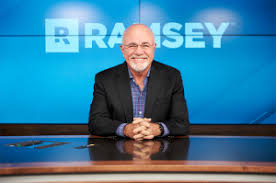
Borrowing money can be good…very good.
Dave Ramsay’s advice on borrowing money is almost heresy. Dave Ramsay did not get rich by not borrowing money. He got rich by having a TV and radio show where he told other people not to borrow money. He probably borrowed money to expand his broadcasting business!
I borrow money when I can invest that money for a greater return. Do you need to reread that sentence? I borrow money when I can invest that money for a greater return.

I’ll share two major examples of this. Our home loan, for our modest seaside cottage, is fixed at 2.25% for 10 years. It’s an interest-only home loan. For 21 years my investments have earned 7.9% on average each year. Why would I want to take money that is earning 7.9% to pay off a loan where I am being charged just 2.25%?
Why would I EVER want to take money from an investment account, to pay down my mortgage balance? The value of my house is independent of my mortgage balance. If I have a home worth one million dollars its value will go up, down, or sideways regardless of my mortgage balance.
I feel so strongly about this that I NEVER want to pay off my home loan. I want to be able to borrow as MUCH as the bank will lend me. If my house goes up in value, I want to take cash out as soon as I can. I have refinanced our home loan six or seven times since I retired. Honestly, I can’t believe how much the bank will loan me considering I have not earned a penny working since I retired.

During our last refinance First Republic (Yes, I know!) even sent me a check for $300,000. What did I do with that check? First, I cashed it before they changed their minds! Then I invested the money in the same types of investments that I have used with Vanguard for the past 21 years. But…I learned something along the way. I’m spending that refi money and more of my other investment gains. Invested money is to be spent because we all know how short the future ride is in boat 75, right? Plus…did I tell you the government lets me itemize my taxes so they are picking up part of my mortgage tab each year? Don’t throw shade on me. I don’t make the rules. I only play by them.
I can hear some readers now. “Gosh darn it, Randy. I love most of your stuff…but. I’m happy that I don’t owe anybody. I’m happy that I don’t have a mortgage on our home. I can sleep better at night. You really missed the boat (pun intended) on this one”.

Sorry you feel that way. I would be happy to drink a milkshake every day of my life. However, as much as I would LIKE to be drinking a milkshake every day but that would not be a GOOD idea. When you can invest your money at the returns I’ve been getting for 21 years at nearly 8% and get a mortgage interest rate of 3-4% or less it is not going to be a good idea to own your home mortgage-free. We good on that? Probably not!
By the way that is my photo of a Steak ‘N Shake milkshake taken on our recent trip to Marseilles, France. A Steak ‘N Shake in Marseilles friggin France! How cool is that?

I bought a new Tesla Model X electric car. I took out a six-year loan on the car for $100,000, the maximum the credit union would loan me, at 1.99%. Again, there is no way I’m taking money out of an investment account to pay down that kind of loan. It is true that auto loan rates are now much higher. If I had to pay 5-7% for a car loan now I might just pay cash. When things change, I must change as well. I just don’t ever market time!
Just one more comment about my Tesla ownership. I couldn’t resist. I have driven my car 50,000 miles in 46 months of ownership. I have not paid a single penny for electricity. I bought it with free supercharging for the life of my ownership. I have not paid a single penny for ANYTHING except for four tires (two at 36,000 and two at 47,000 miles) – the tires are two different sizes. What about XXX? What about YYY? I have not paid a single penny for ANYTHING except for four tires.

Household budgeting and expense tracking.
I recommend having a household budget as one of my top elements for financial success. As a young investor, that’s you boat 25, you need to know where your money is being earned and where it is being spent. You’ll never get rich working for wages. However, you can save some of those wages and buy things that allow you to be an owner. Owners get rich off the backs of wage-earners! Stocks, bonds, real estate, and owning your own company fall into this ownership category.
I have a household budget. I’ve had one almost from the beginning. However, for the past many years, I don’t limit our spending based on a budget. What I do in place of living on a budget is “expense tracking”. I track our expenses through a very customized financial recording system that I created myself. This allows me to see where our money is flowing for the purpose of avoiding any pitfalls of overspending. I could probably live without this step. However, I have fun with expense tracking. It’s not difficult to do and I’m good at it.

Rebalance.
Rebalancing is a financial strategy of selling your winners and buying more of your losers. I just rebalanced last night on “10/10” after the markets closed. Is that a good idea? Rebalancing sounds sort of counterintuitive, doesn’t it? Why would you want to gid rid of your winners and put more money into your worst-performing investments? Here’s why.

If the Yankees normally win six games out of ten and they just won nine games out of ten (and they didn’t change the makeup of their team) how do you think they will do in the future? They will probably revert to their mean of winning six games out of ten, right? That means if they are performing better than normal now, they will likely perform worse than normal in the future to get back to their long-term performance standards. Just about anyone will tell you it’s a good idea to rebalance your portfolio by selling your winners and investing more into your losers. I rebalance annually. Each time I make a withdrawal during the year I sell my winners. This way I am always nudging my asset allocation back in the direction of my overall goal.

Spouse involvement.
I’m lucky. I’ve been married to my college sweetheart for 51 years. I often tell people that if I had killed her on our honeymoon I would probably be out of prison by now. OK, I don’t tell people that but I do think it’s a funny line.

We have led sort of a Leave It to Beaver lifestyle. That may not work for your household. Carol and I each have our own specialties. We try not to get involved in what the other person does best. Carol doesn’t judge or second guess any financial decision I make. I earned the money and I invest the money.
Carol pays the bills. I don’t know when our mortgage is due. I don’t know when the trash man comes each week. I have people for that. Carol doesn’t know what our investments are or what our net worth is. What if something happens to one of us? Our son will jump in to save the day. He and I are in lockstep regarding our investment goals. Like I say I am lucky in this regard.

Spoiler alert! Update!!!
Tonight, October 10, 2023, I returned from a trackchasing trip to Canada. When I walked into the house, after the ceremonial hug and kiss, I asked Carol if she knew what the significance of the “10/10” date was. Without blinking an eye, she said in a whiny voice, “Two things. First, tomorrow you ‘rebalance your portfolio’ and secondly it is your oldest son’s birthday…in that order”. Oh my. She knew! I was nearly as taken aback as when I recently asked Carol if she knew what Chase Bank’s “5/24” policy was as regards credit cards. She knew the answer to that question as well. Maybe she HAS been listening all this time!! Nevertheless, I don’t know when the trashman comes or how to turn the water off in our house. I really don’t. I have people for that!
What I want to change in the future…and I’m already WAY too late in doing this.
When I retired, I totally wrapped my arms around the William Bernstein concepts in The Four Pillars of Investing. Today those general ideas still make good sense.
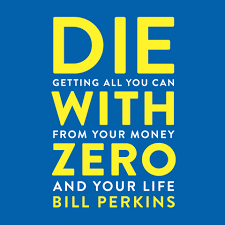
In the past few months, I have come across another book that is equally impressive to me. The book covers a slightly different financial and life strategy. This book is titled “Die with Zero” written by Bill Perkins. You can also hear the highlights of the book on YouTube. I can only call this message transformative.
The title is a bit misleading. Perkins is NOT advocating for someone to die with zero assets as the hearse takes them to the cemetery. Far from it.
What he IS saying is that most people in retirement never come close to spending the money they worked so hard to earn and then invest. I have more money today at age 74 than I did 22 years ago at age 52. Some could say, “Randy, you have had a brilliant investing career as evidenced by what your investments have earned. To prove that point you have more money today so many years later than when you retired”.
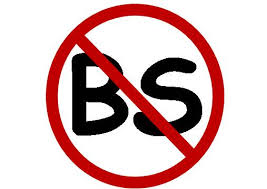
I call bullshit on that analysis. We have indeed splurged on expensive homes and cars and traveled to nearly 100 countries. My financial mantra has been “spend like a drunken sailor”. I think in this area I have done much better than most. Still, I haven’t done enough.

Perkins tells you that once your “survival needs” are taken care of, i.e., housing, food, transportation, and health care, then the funds left over should be used for your own “net personal fulfillment”. What is “net personal fulfillment”? It’s whatever makes you happy. Your family, your causes, you.
He also points out that many people “self-insure” when they shouldn’t. They have large sums of money saved to protect against the catastrophic late-in-life/end-of-life expenses that rarely ever come at least in the amounts imagined. People who are concerned about these costs should insure against them rather than tie up huge sums of money that never get spent but could be enjoyed by “your family, your causes, and you” WHILE YOU ARE ALL ALIVE.
If you’re 30 years old and have 100,000 saved you likely don’t have enough for your future survival needs and need to get to that point. If you’re 95 years old and have 5,000,000 in your piggy bank you likely won’t make a dent in your investment fund before you die. If you’re between 30 and 95 and have between 100,000 and 5,000,000 you might have your survival needs met and you might not be spending enough of your remaining investments to optimize for your own personal fulfillment.
Think about it. You only have three general categories to spend what you have earned. That would be spending your money on yourself, your family, and/or others. If you don’t spend that money, you better have a good estate plan so your money goes where you want it to and not to the government. Oh yeah, the longer you live and don’t share your money with others the less utility that money provides for your loved ones. They’re getting old too!
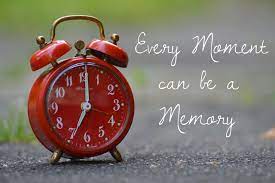
Perkins talks about “memory dividends”. A memory dividend is simply the overall good feeling you get from remembering something you did in your past. Did you have a special skiing trip or family reunion or achieve a personal best? If you created that memory at the age of 20 and lived to be 80 you had sixty years to enjoy the memory. However, if you waited until age 70 to create that special memory and checked out at age 80 you have only ten years to enjoy memory. See the point?
The author also mentions that sometimes people are working so hard to get ahead that they don’t create many memories. They are at risk of “Dying with Zero” dying with zero or very few memories. Bill Perkins points out, and I agree, that it’s better to do so many things when you are younger than when you are older. You’ve all observed people who get to a point where they can’t physically or mentally do much and end up doing almost nothing…while their investment accounts grow every year.
Perkins goes on to explain that most people have accumulated more money years into retirement than when they quit working. Expenses, except medical care, go DOWN for older people. People end up spending less as they age compared to when they were younger. What good is having so much more money when you are older that you could have enjoyed when you were younger?

On average most people live to be about 80. Is it a good idea to start giving money to your kids when you are 80 and they are in their 50s? Maybe not. Even as people reach their 50s, they can’t enjoy many of the things money can buy like they could have when they were in their 30s. Do you want to give money to charity? Would your charity of choice be better able to use $50,000 today when you are sixty or $100,000 when you are 80? Why don’t you ask them that question?
I have only lightly touched on the Die with Zero book written by Bill Perkins. I strongly recommend you get that book and read it a time or two like I have done. Then develop an action plan. I’m beginning to do that right now. I haven’t figured out exactly what I’m going to do but I will do something. I should have more on this in my 2024 update.
What you have read is an update to my “Financial Plan of a Lifetime”.
Just so we are on the same page let me tell you what we are NOT talking about today. Knowing how to manage money is fine. But I’m sure you’ve read that money isn’t everything. There are several offshoots to that saying.
Always remember, money isn’t everything – but also remember to make a lot of it before talking such foolish nonsense.
Money isn’t everything but it sure keeps you in touch with your children.
Money isn’t everything as long as you have enough.
I’d rather have money than not have money. However, I’d rather have good health than money. Remember, today we are NOT talking about your spiritual being, your eating habits, your voting positions, or your personal hygiene habits. We’re just talking about retiring early enough to enjoy your free time and having the financial wherewithal to enjoy your life.
Wanna work til you die because you couldn’t find anything else to do with your time? Wanna work til you die because you didn’t take the right financial steps all during your life? Go for it! Just remember if you plant corn, you get corn.

(Above – rowing Carol around Central Park…and staying in the friggin’ boat!)
Randy Lewis
Retire from work but not from life
